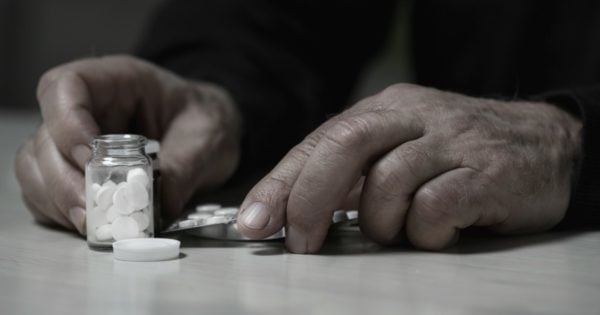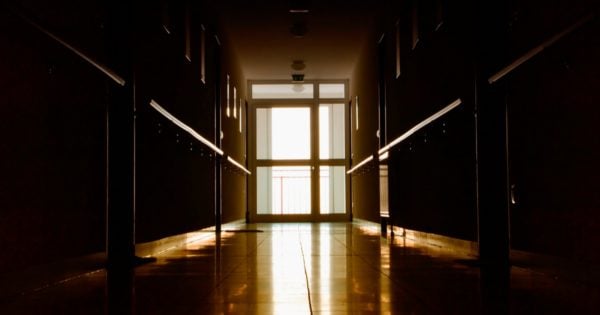The morning my mum stood at the front door of my studio, a note in her hand with a key attached, changed both our lives forever.
“I think Jim has gone and done something stupid”.
I read the note, naively thinking perhaps I’d find my stepdad in a state of inebriation down at the shed. I ran to find him, straight past the car containing his lifeless body. But the haunting cry of my mum, which stays with me to this day, directed me to turn around.
Many months before my stepdad had been diagnosed with an extremely rare condition, a rouge vain had found its way into his spine at the T7 vertebrae, causing an aneurysm that crushed his spinal cord. The pain in his lower body from the nerve damage had become excruciating and was getting progressively worse. He described it like constantly standing in boiling water or being electrocuted. He couldn’t handle anything accidentally touching him. He lost the ability to control his bladder and was losing the ability to walk.
The plethora of prescribed drugs did nothing to ease his pain. He decided to take his own life while he was still capable.

My mum could never reconcile that my stepdad had kept this secret from her when they’d intimately shared everything in their lives. My stepdad, the meticulous planner, had ensured that every action he’d taken had been done in a way to ensure we weren’t implicated in his death.
I saw a part of my mum died along with my stepdad the day he took his took his life. Along with losing the love of her life, she lost her will to live.
The shock of that day hit us both differently. My mum began taking strong antidepressants to cope with the nightmares that regularly haunted her. I developed PTSD, my whole attitude to life changed for the worse. This entire chapter of our lives could have diverged on a much happier path if my stepdad had been allowed the option of ending his life in a painless, peaceful and humane way, with his family holding his hands as he passed over.
It was barely surprising, then, when my mum’s breast cancer returned after 17 years in remission. By the time she was diagnosed it had spread throughout her spine. In a bizarre twist of fate my mum’s spinal cord crushed at the T7 vertebrae, the same as my stepdad, giving her the same painful symptoms that he had endured.
My mother once again tried to battle the disease, undergoing surgery to try to rebuild her spine and take the pressure of the badly damaged cord, and for a short while it seemed promising. However, her paraplegia meant she couldn’t live at home any more and she lived her final years moving between hospitals and the nursing home.

There were times when the pain of her crushed spine would be too much for her. She would pull me close and beg me to help her end her life. She would ask me to secret her an overdose of the strong painkillers she had left over at home or suffocate her in her sleep.


Top Comments
There are always advances being made in medicine re pain relief and other treatments. Undoubtedly some people in the past were in terrible pain prior to death, but many of those people (if faced with the same medical conditions today, would receive better palliative care and would have peaceful deaths). Some of the horror stories we hear may be because people (1) lived in remote areas and were unable to access appropriate services and /or (2) were treated by doctors who were not adequately trained in pain relief and therefore were not given the rights drugs or the correct dosage.
Having worked with many chronic patients for many years, I have found the overwhelmingly vast majority don't want to die, they just want pain relief and even if they can't get relief they still feel life is worth living as they have friends/family/something that gives life meaning.
personally I feel euthanasia is not the answer My concerns are (1). it is cheaper for governments to euthanase people than provide good palliative care. (2) greedy, grasping relatives may "encourage" elderly/sick relatives to die so they can get their hands on their assets, and euthanasia ( as we have seen overseas gets extended from being something from the terminally ill, to something for people in chronic pain, to something for people with mental illness, to something for people with disabilities, so an option for prisoners who don't want to stay in jail etc etc, I think the push for euthanasia contradicts our efforts in suicide prevention. people may feel like they wish to die one day but the feeling passes and they look bad and they are glad they lived to see another day. Many people who are advocating for the right to euthanasia, may push for the right and never use it, but unintentionally create a situation where vulnerable people are propelled to their deaths,
I truly wonder if the people who are against voluntary euthanasia have actually seen a loved one in those horrific last few days of life. Or do they think it's like the movies where your loved one says a few nice words and closes their eyes and dies peacefully?
I will never forget watching my grandmother in her last few weeks of life. It was torture for her and torture for us. She was in pain. She was so sick. She couldn't eat, she couldn't talk, she couldn't walk, she couldn't control her bowels, she wanted to die so badly but her body was fighting. Every good memory I have of her becomes blurred with her final life moments. The easiest way to deal with it is to block her out of my memory.
Doctors make the decision to stop medicating all the time, stop food and water and allow the dying process to begin. How is this any different to an elderly or sick person choosing to die a dignified death?
I would never want to suffer as my grandmother did. She was a a amazing, kind person and she didn't deserve to suffer like that.
From my experience it seems to be split along religious lines, not surprisingly.
Many Palliative Care Physicians are not religious, yet they are anti-euthanasia. I am not against legalized euthanasia, but many scenarios where people have described the horrible death a loved one went through, is because of lack of decent terminal/palliative care. Pro-euthanasia advocates cite Holland as the bench mark to copy, but their euthanasia laws have been at the expense of increasing Palliative Care Services. Elderly patients are euthanized (without prior consent) and oversight has been lacking. What started out as euthanizing the terminally ill, now covers; mental illness, children and anyone who is simply bored with life. Should euthanasia be legalized, would medical and nursing staff have the right to not participate in euthanizing a patient?
What are they against?
You are describing issues with the palliative care / euthanasia system, that can be changed. Euthanasia as a moral choice is not something that changes, generally.
I'm sorry to hear your grandmother had to go through that. It actually surprises me a little as I'd always assumed it was the norm for doctors to give their patients some morphine to both ease and speed up the process once it becomes clear that they have well and truely given up and all life has left in store for them is a few days or weeks of extreme suffering.